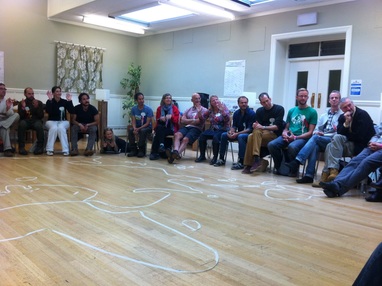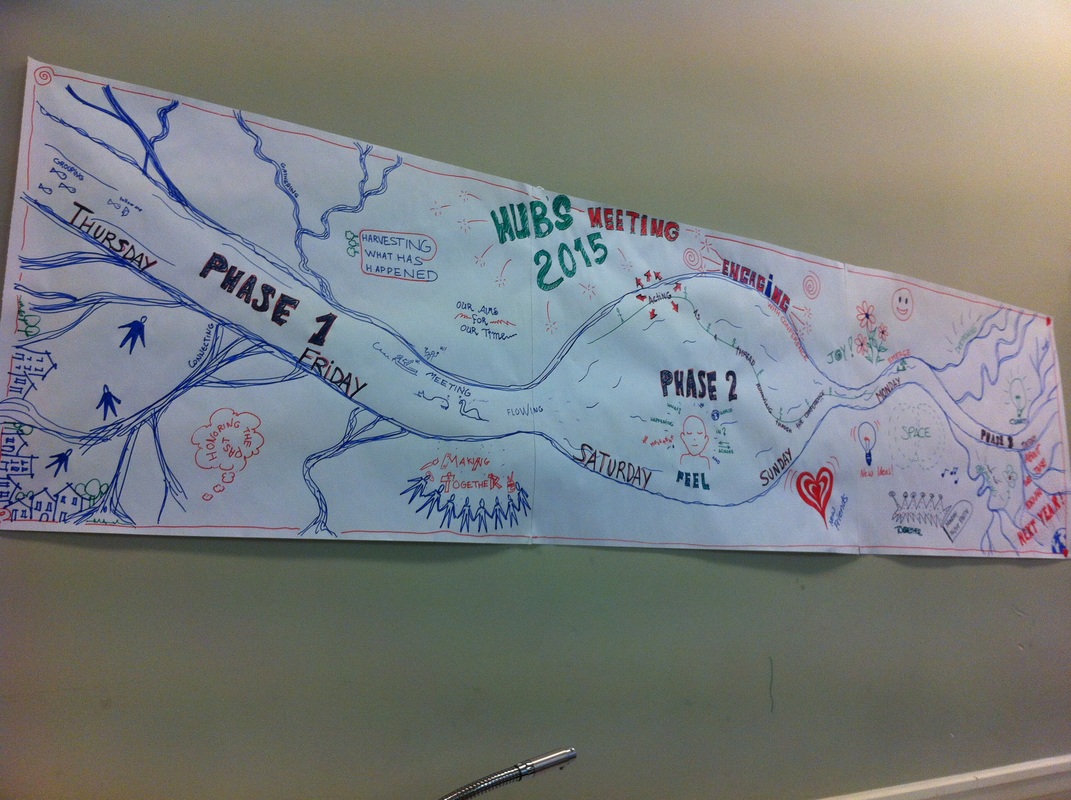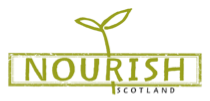|
In September I spent an intense 5-day period in Devon, southern England, attending the 2015 International Transition Conference. As part of the conference, the national Hubs, consisting of representatives of Transition in specific countries or regions, met to discuss what the Transition movement is, how we are doing, and where we should be heading. Strategic matters were discussed such as the role of the Transition Network, the Transition movement’s stance on COP21, and what support local initiatives may need from a national hub. There were more practical discussions, such as whether we can develop a Transition exchange platform similar to wwoofing, or how we could incorporate more Inner Transition into the organisation of our movement. But most of all, the meeting demonstrated the value of coming together and supporting each other as a group. The main conference took place over the weekend of Sep 19th and 20th. It in turn was “hugged” by the International Hubs meeting, taking place a day before and two days after the conference. But I was there already on the Thursday, Sep 17th, for a gathering of Transition “youth.” So it is no understatement to say that I was fairly Transitioned out after this period – but it was simultaneously an amazingly inspiring and energising time. Below I will describe mainly the Hubs meeting, a separate report from the youth day will come soon. Coming from a political theory background as I do, the evolution of the Transition movement is truly interesting, and it is definitely a child of its time. With Transition groups springing up all over the world, in all kinds of different circumstances, and with a range of different interpretations of what Transition actually is, it is no wonder that considerable amount of time and effort is spent in the movement on figuring out its governance structure, cohesion, and future development. An integral part of this is the development of something they call International Hubs – basically nodes in the Transition “web” that are responsive to their local region needs, acting in a supporting role, and facilitating communication between the local and the global level. What we can see is the development of an international movement, trying to be non-hierarchical, self-organising, and creative, simultaneously setting global trends and responding to local needs. In some way or another I got roped into representing Scotland at the International Hubs meeting and thoroughly enjoyed the opportunity to learn more about how such a social movement can work in practice. Something I realised during that meeting is that the Hubs constitute a platform that increasingly holds and shapes the identity of the Transition movement, its vision and direction, and its practices. Now, in practice that means lots of people (I think we were about 50), from lots of different countries and cultures (26 different countries to be exact), speaking different languages, and having different interpretations of what Transition is, all trying to communicate, deliberate, and agree on things. Wow! A full report of each and every part of the meeting will be coming out presently (it’s a joint effort by all “Hubsters”). Here I thought I’d share with you my experience of what such a process looks like, and what we can learn from it for our local level.  Hubs meeting Day 1 – Friday Sep 18th Landing and connecting The Hubs meeting started with a long process of landing in the space and connecting with each other. We were sitting in a large circle around a beautiful mandala and had a ceremony of sorts: we had been instructed to bring some soil from our country (I had completely forgotten but found some good Scottish mud on my boots). When we felt ready for it, we were invited to put our soil in the middle of the mandala while also stating what we were bringing to the meeting in terms of intentions, experiences, and expectations. This was followed by mapping out which countries we’d all come from and finally remembering all those people who are important to the Transition Hubs but who could not attend the meeting. All of this gave a deep sense of how diverse a group we were, how many different countries were represented, and how many people were standing behind us and supporting us. This feeling was enhanced throughout the days as we would often start and end sessions with someone reading aloud a poem in their native language and its translation. We spent a considerable amount of time connecting and tuning in, to ourselves and to each other. One tool for this that I especially liked was Pinakarri, meaning Deep Listening, that is used in Dragon Dreaming. We had a bell at the centre of our circle that anyone could ring when they felt the attention drop or the energy change for the worse in the room. When the bell was rung, everyone stopped and took 30 seconds to reconnect with the earth, feel gravity and feel how we are all being held in the space we inhabit and are part of something bigger, remember to breathe and relax out of the momentary tensions that long meetings can entail. Then we would continue or discussions. The effect of all these connecting practices was profound. At first I was surprised that we spent so little time on “content” and so much time on our personal connection to each other. But I came to realise throughout the days that the bonds and trust these activities were creating made us understand each other on a much deeper level, and when we came round to actually discussing “business,” we did it with more clarity, more efficiency, and less tension than I had anticipated. Process A lot of time, especially during the first day, was spent discussing and defining process. Emphasis was placed on how we are all co-responsible for the meetings rather than being “customers” of a service the facilitators provide. That meant we had to collectively agree on the process of the meetings. Basics of sociocracy were introduced – everyone tried out the funky hand signals – and we went over the facilitator contract and group rules. The common Transition meeting practices such as keepers of time, heart, and record, and housekeeping, were also introduced. These are circulating roles and greatly helps the facilitators. This was a fairly long process, and I could sense that some of us were rather keen to move on. But I think the fact that we had taken the time to agree on this and talk it over made the rest of the meetings run more smoothly. Harvesting The afternoon of the first day was then spent harvesting experiences from the Transition Hubs during the past year. We had all been instructed to make a poster about our hub with key events and facts, such as energy levels in the group, volunteers/staff, funding, etc. We were then given 3 minutes each to present to the rest of the group, instructed to focus on one success and one challenge of the previous year. This may seem like a very short time, but when you are so many groups presenting it was more than enough! Afterwards we had time to mill about and look at each other’s posters and ask more specific questions if we wanted to. At first I was surprised at this element – how could anyone communicate their learnings in only three minutes? But what I realised is that there is not too much value in learning the details of everybody’s initiatives and activities. We are all experts in our own regions, but that does not necessarily mean that our knowledge is applicable anywhere else. So although sharing experiences in detail is well meant, it can consume a lot of energy and not be very productive. <– Transition Scotland explained in 3 minutes… Main Conference Saturday Sep 19th and Sunday Sep 20th During the main conference the Hubsters took part in the workshops and didn’t have any separate meetings. There was however some energy out into communicating what the Hubs are and do to the rest of the conference participants. There is a lot of work within the Hubs group to be inclusive, open, and understanding. But this can mean that there is not so much communication outwards, and I got the impression during the conference that there were many who were unaware of, unsure about, or even uneasy with the nature of the Hubs. As an attempt to combat this, there was a conscious attempt from Hubsters to reflect on how to interact with and integrate into the conference. The results included
There were many different workshops, on topics such as Sociocracy 3.0, Reclaimed Food Café, Creative Facilitation, Setting up a Community Owned Renewable Energy Company, Conflict as Possibility, Indigenous Arising, Telling the Transition story, Systemic change, Reinventing Democracy, Community Land Trusts, REconomy, and even a global webcast. On the Sunday we had an enourmous Open Space – introduced as a comedy flight safety briefing to everyone’s amusement. It was creative and chaotic, and I think some very good discussions were had. The main things I took away from the conference were
Hubs meeting Day 2 – Monday Sep 21st The following day we were back to business. Even more time was spent on connecting to ourselves and one another. We then had an Open Space of sorts where ideas and projects to take forward for the coming year were discussed. Through a sociocracy process some proposals were taken forward for working groups, examples include:
Reflections: what’s in it for Scotland
0 Comments
Your comment will be posted after it is approved.
Leave a Reply. |
DonateLink to follow... please use the contact form in the interim. Blog Categories
All
Copyright © 2020 Transition Scotland, All Rights Reserved Associated Links
|






